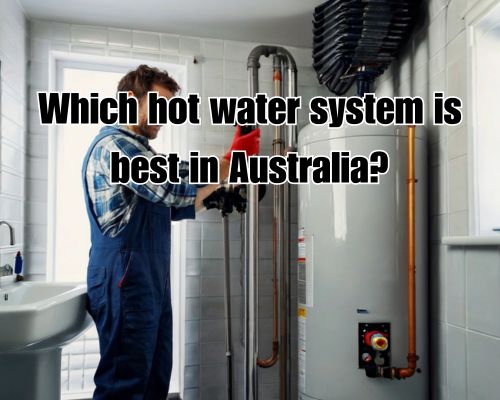Which Hot Water System Is Best in Australia?

A Comprehensive Guide
Selecting the best hot water system in Australia depends largely on your household size, energy efficiency needs, and environmental concerns.
Dean Owens of Plumber Warragul said the for most households, a solar hot water system can be the most efficient and cheapest to run. These systems harness renewable energy, making them a great choice for those looking to reduce their environmental footprint.

For smaller households or those with specific noise-level requirements, heat pump hot water systems are an excellent option.
These systems are relatively quiet and offer good efficiency, but still require an initial outlay that might be higher than traditional electric systems. Keep in mind that heat pumps are suitable for varying household sizes, typically catering to homes with 3-5 people.
If you’re looking for affordability with easy installation, electric hot water systems might be a more practical solution.
They are the least expensive to purchase upfront, but higher operating costs may arise in the long run.
No matter which option you choose, make sure to weigh the pros and cons considering your specific needs and consult multiple quotes from suppliers to get the best deal.
Types of Hot Water Systems in Australia
Choosing the right hot water system is crucial for balancing energy efficiency, cost, and comfort. Below, find details on the primary types of hot water systems available in Australia, including their features, benefits, and considerations.
Electric Hot Water Systems
Electric hot water systems are one of the most common types. They use electricity to heat water stored in a tank.
These systems include storage tanks and continuous flow models.
Storage tank systems can provide immediate hot water but have limited capacity, ranging from 25 to 400 litres.
The typical cost for an electric hot water system can vary between $500 and $2000, depending on the size and brand.
Continuous flow electric systems heat water on demand, eliminating the need for a storage tank.
The operating cost depends largely on your electricity plan, with off-peak electricity tariffs offering potential savings.
Energy efficiency is moderate, and MEPS (Minimum Energy Performance Standards) apply to ensure regulated energy consumption. Regular maintenance is crucial for prolonging the system’s lifespan.
Gas Hot Water Systems
Gas hot water systems are powered by natural gas or LPG. They come in both storage tank and continuous flow configurations. Brands like Rinnai, Aquamax, Rheem, Dux, Bosch, and Thermann offer various models with different capacities and efficiency ratings.
Storage tank gas systems store and heat water, ready for use at any time.
They are known for their quick recovery rates and can support large households.
Continuous flow models, such as the Rinnai Infinity series, heat water on demand, offering an energy-efficient solution without the need for a tank.
One of the key benefits of gas systems is their relatively lower running costs compared to electric systems, particularly in areas where natural gas is readily available.
Solar Hot Water Systems
Solar hot water systems use energy from the sun to heat water, significantly reducing greenhouse gas emissions and energy costs.
The system typically includes collector panels mounted on the roof and a storage tank.
Initial costs can be higher, ranging from $4000 to $8000, but government rebates and the Small-Scale Renewable Energy Scheme can help offset these prices.
These systems are highly energy-efficient and environmentally friendly. They work best in sunny climates and may require a gas or electric booster for overcast days or high demand. Regular maintenance, such as ensuring the collector panels are clean and free of debris, is necessary to maintain efficiency.
Heat Pump Hot Water Systems
Heat pump hot water systems extract heat from the surrounding air to heat the water.
These systems are highly energy-efficient, with running costs up to 60% lower than conventional electric hot water systems. Prices for heat pump systems typically range from $2000 to $4000.
Heat pumps can be less effective in very cold climates, requiring a defrost cycle in freezing conditions.
Noise level, usually around 50-60dbA, can be a consideration if the unit is installed close to living areas.
Government rebates and incentives are often available to offset the installation costs. Maintenance involves regular inspection of the compressor and ensuring the system is free from obstructions.
For water system works, you can have Plumber Warragul do it for you.
Choosing the Right Hot Water System
Selecting the ideal hot water system depends on various factors including household size, energy efficiency, and budget. Evaluate different types, brands, and technologies to find a system that provides optimal performance and cost-effectiveness.
Considerations for Selection
When choosing a hot water system, household size is crucial.
For example, a 250L heat pump system might suit a household of 3-5 people.
Solar hot water systems use panels to harness sunlight and can be bolstered by gas or electricity.
Brand reputation matters.
Rinnai, Aquamax, Rheem, and Dux are well-regarded for reliability.
Rinnai’s Infinity series is particularly favoured for its continuous flow technology.
Storage capacity should match household needs, while modern systems often come with warranties for peace of mind.
To offset initial costs, explore government rebates and incentives for energy-efficient systems.
Installation costs can vary, so obtain multiple quotes to ensure value for money.
Factors Impacting Performance and Cost
Energy efficiency directly impacts your energy bills and running costs.
Heat pump systems extract heat from the air. They are efficient but possibly pricier upfront. For solar hot water systems, running costs can be significantly lower, especially with government rebates.
Off-peak electricity tariffs can also reduce costs for electric storage systems. Be mindful of carbon emissions; non-renewable systems may contribute more to your carbon footprint.
Water quality affects longevity and performance. Poor quality water necessitates more regular maintenance.
Design and technology such as continuous flow systems (like those by Rinnai) offer consistent temperatures. Storage systems need adequate space and insulation to minimise heat loss.
Evaluate each factor to find a system that delivers long-term efficiency and meets your household’s specific needs.





